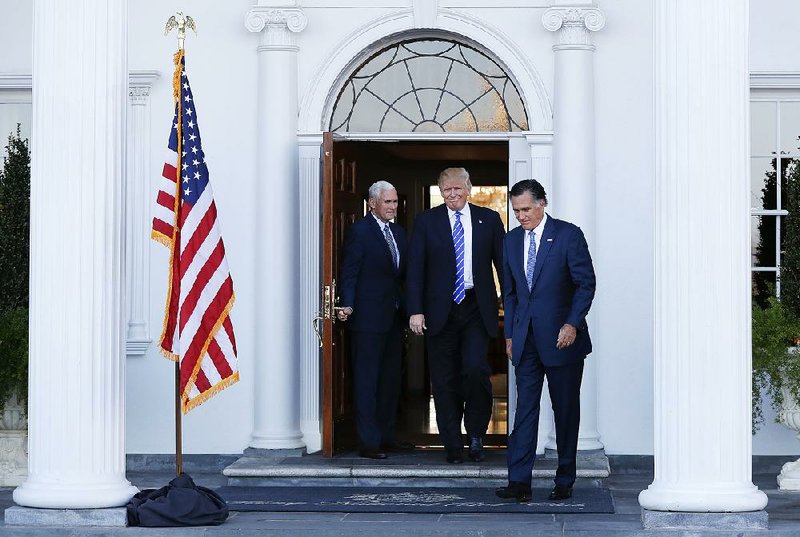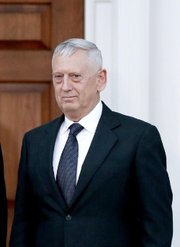BEDMINSTER, N.J. -- President-elect Donald Trump on Saturday moved to mend fences with political rivals after a divisive campaign, meeting with Mitt Romney to discuss naming him as secretary of state.
It was not clear whether Trump had offered the State Department post to Romney, who had criticized Trump during the presidential campaign as "a phony" and "a fraud" -- or whether Romney, who has broken sharply with Trump on Russia, free trade and other issues, would accept if Trump did.
Trump met with Romney for about 90 minutes. Afterward, both men exited their meeting and shook hands for the cameras. "Went great," Trump said, cupping his hands at his mouth to project his voice. Romney then briefly addressed reporters, declining to say whether he was interested in a Cabinet position.
"We had a far-reaching conversation with regard to the various theaters of the world with interest to the United States of real significance," Romney said. "We discussed those areas and exchanged our views on those topics. A very thorough and in-depth discussion over the time we had. I appreciate the chance to speak with the president-elect and look forward to the coming administration."
[TRUMP: Timeline of president-elect’s career + list of appointments so far]
John Feehery, a Republican strategist, said Trump was showing "great magnanimity" by talking to Romney, the party's 2012 presidential nominee and a former governor of Massachusetts. "I think it is meant to reassure some of the establishment that he is going to reach out to them, and that's an important part of healing the party."
Some strategists argued that by reaching out to Romney, Trump was demonstrating an openness to new people and ideas.
That was expected to continue during the weekend's transition talks at Trump National Golf Club in Bedminster, N.J., where Trump was to hold a series of discussions with what his aides described as a diverse array of potential advisers. Among those who went to the talks was Michelle Rhee, a Democrat who served as the chancellor of public schools in the District of Columbia from 2007-10.
Rhee was accompanied by her husband, Kevin Johnson, a former professional basketball player and the Democratic mayor of Sacramento.
Choosing Rhee as education secretary "would show real disruption," Feehery said. But she is "also someone who has a real track record of delivering the kind of results he's looking for, and who the establishment hates."
Rhee governed with a brash style as chancellor of Washington's public school system, which was struggling at the time to improve underperforming schools and reverse below-average test scores. She angers teachers' unions by firing teachers who have received poor evaluations, renegotiating teacher contracts to weaken seniority protections and tie their pay to student achievement, and endorsing vouchers to allow poor students to attend private schools.
Rhee, who founded the education advocacy group StudentsFirst, has been a supporter of Common Core, a set of education standards that Trump has said he will scrap.
Trump also met with Betsy DeVos, a Republican donor from Michigan and an advocate for school vouchers.
Others attending the meetings in New Jersey were Robert Woodson, a black conservative who works on community-based anti-poverty programs, and James Mattis, a retired Marine Corps general who headed the U.S. Central Command and is being considered for the post of defense secretary.
Mattis oversaw U.S. forces in the Middle East from 2010-13. He was said to have consistently pushed for the military to punish Iran and its allies, including calling for more covert actions to capture and kill Iranian operatives, and for interdictions of Iranian warships.
Former defense officials said Mattis' views on Iran caused him to fall out of favor with the administration of President Barack Obama, which was negotiating the Iranian nuclear deal at the time.
Mattis, who also clashed with the administration over its response to the Arab Spring and on how many troops to keep in Iraq, was forced to retire earlier than expected to clear room for his replacement at U.S. Central Command. Mattis, now a fellow at Stanford University's Hoover Institution, has publicly criticized Obama's defense and national security policies.
Trump strongly praised Mattis after talking with him for about an hour. "All I can say is he is the real deal -- the real deal," Trump said.
Other Trump visitors
Visitors to Trump's golf course late in the day Saturday included Todd Ricketts, co-owner of the Chicago Cubs, and restaurant executive Andy Puzder.
Rounding out the day were financier Lew Eisenberg and health-care billionaire Patrick Soon-Shiong.
Some of the visitors avoided questions, but Puzder said: "I would be proud to serve in any position this president asks me to serve in."
When asked about appointments, Trump said Saturday: "You'll hear some things tomorrow."
Trump also bantered with reporters watching the comings and goings.
"Everything OK out there?" he asked. "Need some chocolate, need something? I'll send some stuff. I'm not allowed to do that, but I will."
Today the president-elect is to meet with Gov. Chris Christie of New Jersey; former New York Mayor Rudy Giuliani, who has also been a contender for the secretary of state post; and Kris Kobach, the Kansas secretary of state, who is on Trump's transition team and who has pressed aggressive measures to crack down on illegal aliens.
In a separate matter, on Friday it was announced that Trump had agreed to a $25 million settlement to resolve three lawsuits over Trump University, his former school for real estate investors. The lawsuits alleged that the school misled students and failed to deliver on its promises in programs that cost up to $35,000.
Trump has denied the allegations and had said repeatedly that he would not settle. New York Attorney General Eric Schneiderman, who announced the settlement, called it "a stunning reversal by Donald Trump and a major victory for the over 6,000 victims of his fraudulent university."
Schneiderman said the program was presented as a "university" even though it did not offer degrees, violating New York education law.
Trump tweeted to his 15 million followers Saturday that he settled only to better focus on leading the U.S.
"The ONLY bad thing about winning the presidency is that I did not have the time to go through a long but winning trial on Trump U," Trump wrote in a tweet. "Too bad!"
Washington protest
Trump spent the day away from Washington, where white nationalists from around the country gathered to celebrate what many proclaimed as a coming-out moment in their mission to turn back multiculturalism and eventually create a whites-only "ethno-state" in North America.
"There's an energy in this city that I've never felt before," said Gerald Martin, 64, a retired teacher from Dallas who was one of nearly 275 attendees of the annual conference put on by the National Policy Institute in the Ronald Reagan Building. Its president, Richard Spencer, coined the term "alt-right" and is a vocal proponent of what Spencer refers to as "white identity."
"I love the smell of napalm in the morning," Martin said, referring to a line from the war movie Apocalypse Now. "And we just napalmed the s*** out of Hillary Clinton and everyone who supports her."
He and others welcomed media to the gathering and hailed what they called the "mainstreaming" of their ideas. But they met fierce resistance during their two-day gathering, with protesters disrupting a National Policy Institute dinner Friday and crowding the pavement outside the conference Saturday.
"NPI -- Today's KKK," read one sign in the crowd of about 200 people whom security guards kept from entering the Reagan Building as police blocked traffic. Half of the crowd chanted "We say no to racist hate!" The other half responded, "We don't want a white state!" A few had red bandannas or black masks covering the lower halves of their faces.
"We have to resist the idea that fascism and a white supremacy organization can be normalized," said Perry King, 61, a District of Columbia resident and psychotherapist. "We can't let them be mainstream. That's what happened with the Nazis. We have to play Whac-A-Mole now and not let them become 'normal.'"
Information for this article was contributed by Michael S. Schmidt and Julie Hirschfeld Davis of The New York Times; by Catherine Lucey, Laurie Kellman, Mark Kennedy, Errin Whack, Jonathan Lemire, Jill Colvin, Stephen Braun, Robert Burns, Jack Gillum and Elliot Spagat of The Associated Press; and by Steve Hendrix, John Woodrow Cox and Katherine Shaver of The Washington Post.
A Section on 11/20/2016

